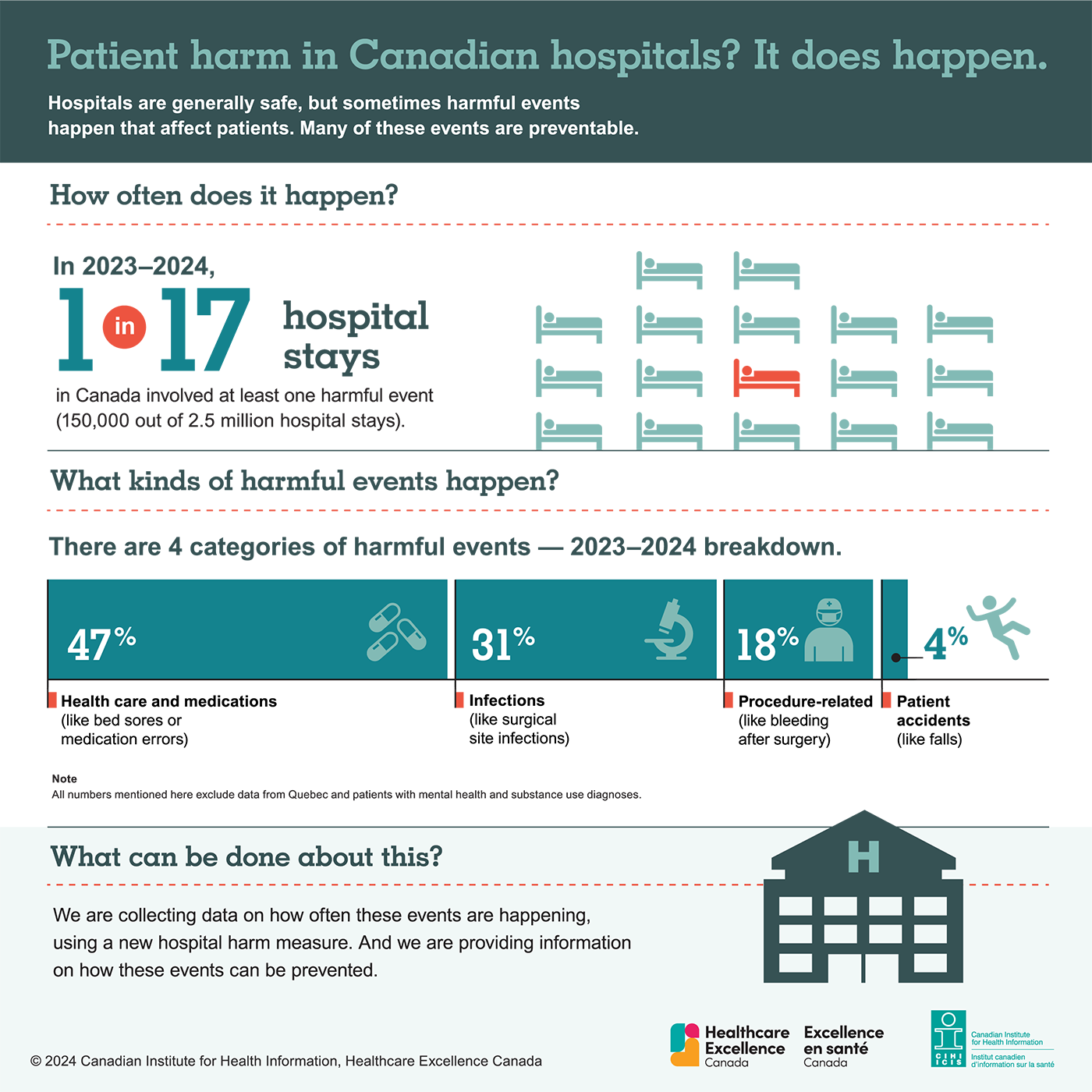1 in 17 hospital stays in 2023-24 involved unintended harm. Specifically, CIHI’s Hospital Harm measure shows that the rate of potentially preventable harm to patients in Canadian hospitals remained at 6 per 100 hospitalizations, higher for the fourth year in a row. Harm rates were mainly driven by healthcare- and medication-associated conditions and healthcare-associated infections.
The Hospital Harm Measure reflects hospitalizations with at least one occurrence of potentially preventable harm — harm that could be prevented with the use of known, evidence-based practices.


Denise McCuaig, Executive Director at Healthcare Excellence Canada, highlights the importance of person-centred care, effective communication, and creating safe, equitable spaces to reduce harm and improve patient safety.
Join Healthcare Excellence Canada to make care safer
Canadian Patient Safety Week 2024
Join us October 28 – November 1 for Canadian Patient Safety Week 2024 to explore a new approach to safer care and how we can all make an even bigger difference every day.
Hospital Harm Measure
The collaboration between the Canadian Institute for Health Information (CIHI) and Healthcare Excellence Canada on hospital harm is aimed at answering the question, "How often do patients experience harm in hospital?"
This initiative uses administrative data to develop a patient safety measure for inpatient care.
There are three outputs from this collaboration.
What is the Hospital Harm Measure?
Hospital harm captured by this indicator is defined as the rate of acute care hospitalizations with at least one occurrence of unintended harm during a hospital stay that could have been potentially prevented by implementing known evidence-informed practices. While not all instances of harm captured by this indicator can be prevented, adoption of evidence-informed practices can help to reduce the rate of harm.
Harm is captured only when it:
- Is identified as having occurred after admission and within the same hospital stay;
- Requires treatment, alters treatment or prolongs the hospital stay; and
- Is one of the conditions from the 31 clinical groups in the Hospital Harm Framework
The Hospital Harm Measure is intended to monitor variations in patient safety in inpatient acute care settings at the national level across facilities over time. It is designed to help identify patient safety improvement opportunities in hospitals.
Results for categories and types of harm, aggregated at the national level (outside of Quebec), can be found in the data tables on CIHI’s website.
Hospital Harm Improvement Resource
Healthcare Excellence Canada has developed the Hospital Harm Improvement Resource – a compilation of resources to support patient safety and improvement efforts.
Analytical Report
This analytical report, Measuring Patient Harm in Canadian Hospitals, shares the approach to measuring hospital harm, provides an overview of the status of these patient safety events in Canada (outside of Quebec ¹) and identifies how the data and associated improvement resource can be used for ongoing improvement.
The report includes:
- An overview of the status of patient safety in Canada
- The number and types of harmful events
- The types of patients and their outcomes
- Information on how measurement can be used for improvement
¹ Data from Quebec as well as data for some mental health patients has been excluded due to differences in data collection.
CIHI has also worked with stakeholders to further refine the methodology used to calculate hospital harm. The most current methodology can be found in CIHI's Indicator Library.
